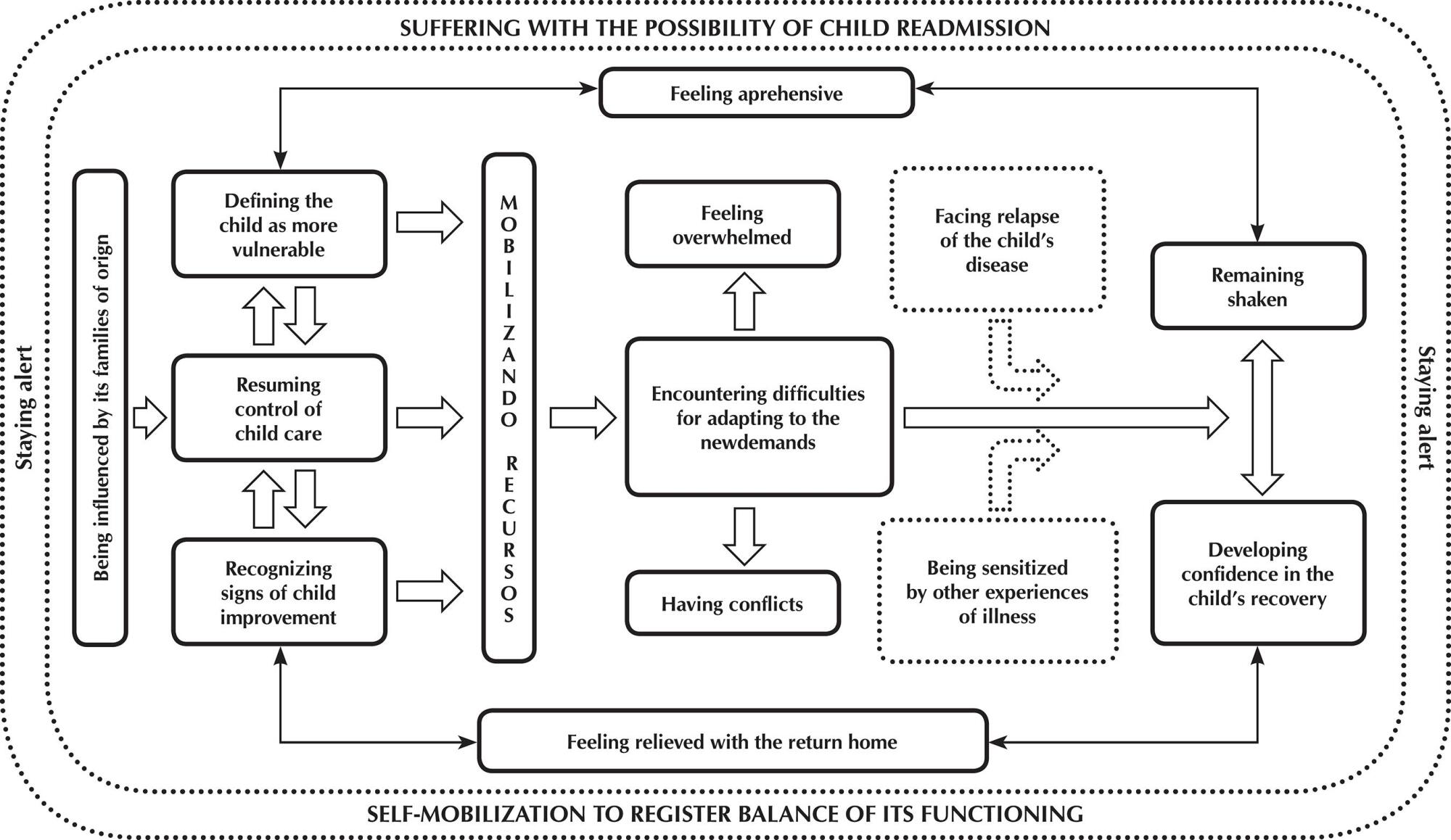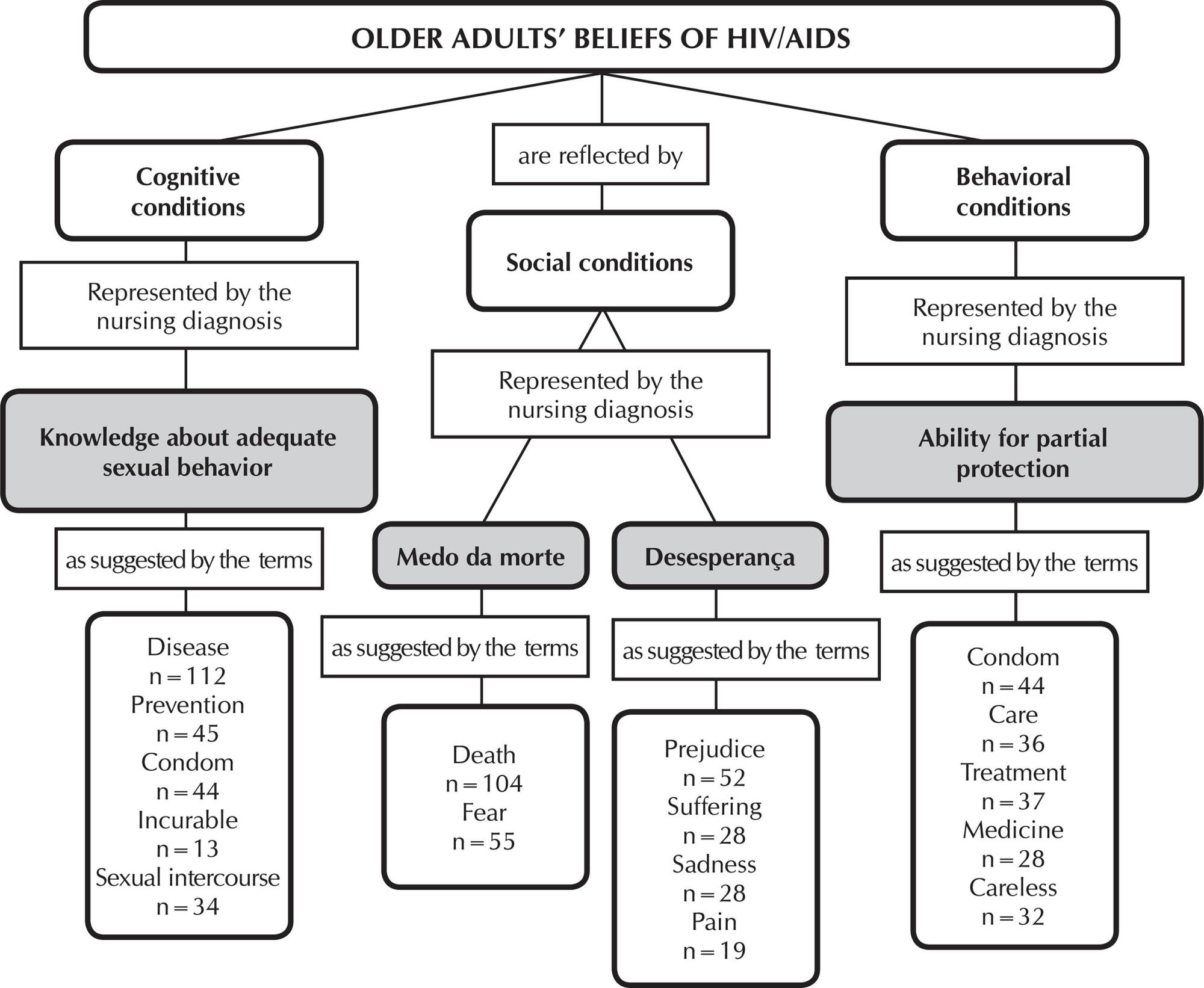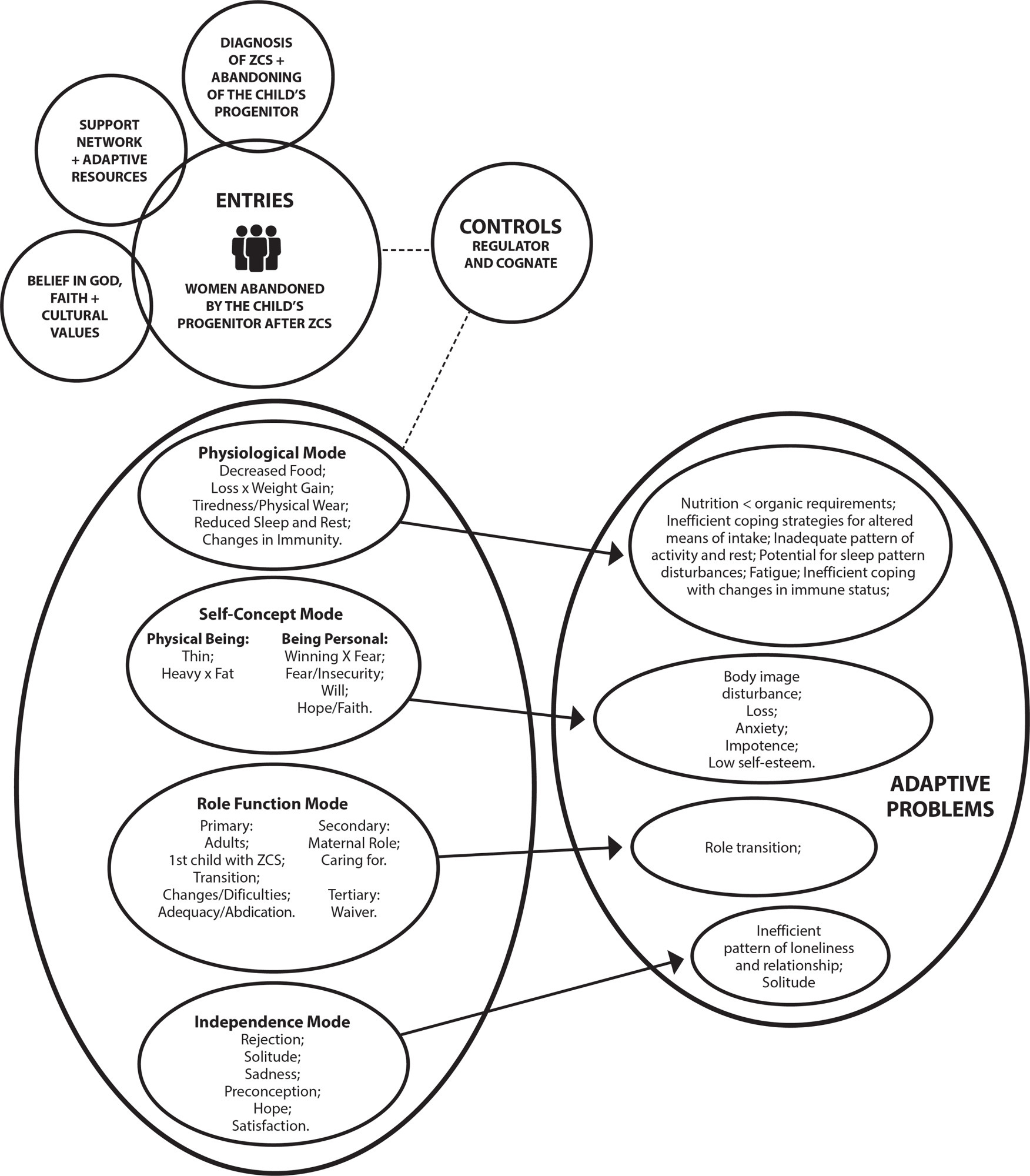-
01-01-2015
Social representations about religion and spirituality
Revista Brasileira de Enfermagem. 2015;68(4):609-616
Abstract
Social representations about religion and spirituality
Revista Brasileira de Enfermagem. 2015;68(4):609-616
DOI 10.1590/0034-7167.2015680406i
Views0See moreABSTRACT
Objective:
to identify the social representations about the concepts of spirituality and religion of of health teachers.
Method:
exploratory and descriptive study, based on a qualitative approach. 25 subjects participated in it. The following instruments were used to collect data: questionnaire to identify the profile; questionnaire of free association, whose inducing words were religion and spirituality, and an interview based on the scale FICA (Puchalski, 2006).
Results:
the representations about religion and spirituality, for professors, are forged around the faith in God and it gives them meaning and purpose to deal with the challenges of personal and professional living.
Conclusion:
there are still barriers that need to be overcome with a view to a comprehensive care. For this, it is essential to incorporate spirituality in the process in the curricula of health courses.

-
01-01-2015
Prevalence and factors associated with smoking among tobacco growers in southern Brazil
Revista Brasileira de Enfermagem. 2015;68(4):603-608
Abstract
Prevalence and factors associated with smoking among tobacco growers in southern Brazil
Revista Brasileira de Enfermagem. 2015;68(4):603-608
DOI 10.1590/0034-7167.2015680405i
Views0See moreABSTRACT
Objective:
identify the prevalence and factors associated with smoking in tobacco growers.
Method:
descriptive, cross-sectional research. Data collection occurred in 2012 through household survey and interviews, including application of a structured instrument and scale Fargeström.
Results:
there were 100 growers included, average age of 46,9 ± 10,8 years; 90(90%) married; 72(72%) white, average family composition 3,7±1,1 people; median number of children 3(1-3), and the average study time 6±2,5. The prevalence of smoking among tobacco growers was 17%, which had less education (p=0.010) and fewer people in the household (p=0.049).
Conclusion:
the prevalence of smoking among tobacco growers was higher than the national average, but the nicotine dependence was low, which can facilitate the smoking cessation process. Highlights the need to implement a program to control smoking among tobacco growers.
-
01-01-2015
The family living the child recovery process after hospital discharge
Revista Brasileira de Enfermagem. 2015;68(4):594-602
Abstract
The family living the child recovery process after hospital discharge
Revista Brasileira de Enfermagem. 2015;68(4):594-602
DOI 10.1590/0034-7167.2015680404i
Views1See moreABSTRACT
Objective:
to understand the meaning attributed by the family to its experience in the recovery process of a child affected by an acute disease after discharge, and to develop a theoretical model of this experience. Symbolic interactionism was adopted as a theoretical reference, and grounded theory was adopted as a methodological reference.
Method:
data were collected through interviews and participant observation with 11 families, totaling 15 interviews. A theoretical model consisting of two interactive phenomena was formulated from the analysis: Mobilizing to restore functional balance and Suffering from the possibility of a child’s readmission.
Results:
the family remains alert to identify early changes in the child’s health, in an attempt to avoid rehospitalization.
Conclusion:
the effects of the disease and hospitalization continue to manifest in family functioning, causing suffering even after the child’s discharge and recovery.

-
01-01-2015
Multiprofessional residency in health: a document analysis of political pedagogical projects
Revista Brasileira de Enfermagem. 2015;68(4):586-593
Abstract
Multiprofessional residency in health: a document analysis of political pedagogical projects
Revista Brasileira de Enfermagem. 2015;68(4):586-593
DOI 10.1590/0034-7167.2015680403i
Views0See moreABSTRACT
Objective:
To analyze MPRH political pedagogical projects (PPP) developed in the state of São Paulo and identify scenarios that are highly favorable to IPE.
Method:
This was a descriptive exploratory study conducted through document analysis.
Results:
The analysis revealed a heterogeneous scenario regarding the curricula, didactic and pedagogical organization, educational objectives, pedagogical matrices and evaluation systems employed. One of the programs was identified as providing a highly favorable setting for IPE.
Conclusion:
The analysis adequately evaluated IPE in educational settings and found a highly favorable scenario for it, identifying didactic, pedagogical, political and organizational MPRH elements.
-
01-01-2015
Beliefs of older adults about their vulnerability to HIV/Aids, for the construction of nursing diagnoses
Revista Brasileira de Enfermagem. 2015;68(4):579-585
Abstract
Beliefs of older adults about their vulnerability to HIV/Aids, for the construction of nursing diagnoses
Revista Brasileira de Enfermagem. 2015;68(4):579-585
DOI 10.1590/0034-7167.2015680402i
Views0See moreABSTRACT
Objective:
to know the beliefs of older adults about their vulnerability to HIV/Aids, and to identify nursing diagnoses.
Method:
a field research implemented in Family Health Units, in João Pessoa, Brazil. The sample included 250 older adults of both genders with data collected from April to July of 2011. A Test of Free Word Association was applied using the term HIV/Aids. A content analysis and cross-mapping of the most frequent terms with the International Classification for Nursing Practice, 2011 were performed.
Results:
202 terms were identified in terms, with an overall frequency of 1156. Of the 202 terms, 16 were more frequent and were used to construct the nursing diagnoses. The diagnoses identified were knowledge about appropriate sexual behavior, ability for partial protection, fear of death and hopelessness.
Conclusion:
understanding these beliefs drew from knowledge about factors related to, vulnerability to HIV/Aids aimed at planning health care actions for this population segment.

-
LETTER TO THE EDITOR01-01-2015
Considerations about the manuscript published
Revista Brasileira de Enfermagem. 2015;68(4):577-577
Abstract
LETTER TO THE EDITORConsiderations about the manuscript published
Revista Brasileira de Enfermagem. 2015;68(4):577-577
DOI 10.1590/0034-7167.20156804c
Views0Re: Chinese auriculotherapy to improve quality of life of nursing team To the Editor,[…]See more -
01-01-2015
A Pesquisa em Enfermagem e os novos rumos a partir do SENPE
Revista Brasileira de Enfermagem. 2015;68(4):571-572
Abstract
A Pesquisa em Enfermagem e os novos rumos a partir do SENPE
Revista Brasileira de Enfermagem. 2015;68(4):571-572
DOI 10.1590/0034-7167.2015680401i
Views0Após quase meio século do início da pesquisa em Enfermagem no Brasil, ainda há necessidade de investimentos para considerá-la consolidada. Os seminários nacionais que discutem a investigação nesta área demonstram esta afirmação ao longo de 17 eventos, por seus resultados e participação da categoria de pesquisadores e prestadores de serviço.O 18º Seminário Nacional de Pesquisa […]See more
-
ORIGINAL ARTICLE10-21-2019
Multidisciplinary team actions of a Brazilian Psychosocial Care Center for Alcohol and Drugs
Revista Brasileira de Enfermagem. 2019;72(6):1624-1631
Abstract
ORIGINAL ARTICLEMultidisciplinary team actions of a Brazilian Psychosocial Care Center for Alcohol and Drugs
Revista Brasileira de Enfermagem. 2019;72(6):1624-1631
DOI 10.1590/0034-7167-2018-0760
Views0See moreABSTRACT
Objective:
to investigate the criteria used by health professionals to identify the phase of consumption of alcohol and drug users, and actions directed to their care.
Method:
a qualitative study developed with 14 professionals from a Brazilian Psychosocial Care Center for Alcohol and Drugs (Centro de Atenção Psicossocial Álcool e Drogas) based in the south of the country. Data were collected in June 2017 through semi-structured interviews and then submitted to thematic analysis.
Results:
the criteria used by the professionals were: periodicity of use; amount and type of drug used; repercussions of misuse; and place that the drug occupies in the person’s life. The actions developed were orientation and referral to support groups, therapeutic workshops and individual care.
Final considerations:
the chronic nature of alcohol/drug use/dependence requires specific care in each phase, and objective criteria to identify and intervene in early phases, aiming at the prevention of chemical dependence.
-
ORIGINAL ARTICLE10-21-2019
Being an institutionalized elderly person: meaning of experiences based on Heidegger’s phenomenology
Revista Brasileira de Enfermagem. 2019;72(6):1632-1638
Abstract
ORIGINAL ARTICLEBeing an institutionalized elderly person: meaning of experiences based on Heidegger’s phenomenology
Revista Brasileira de Enfermagem. 2019;72(6):1632-1638
DOI 10.1590/0034-7167-2018-0763
Views0See moreABSTRACT
Objective:
Analyze the meaning of being an elderly person living in a long-term institution.
Method:
Qualitative study based on Martin Heidegger’s thought. Twelve phenomenological interviews were conducted with people aged over 60 years living in a long-term institution for the elderly in the city of Itabuna, Bahia, Brazil.
Results:
The units of meaning identified were: experience of progressive loss of autonomy and independence, perception of living in an institution as an inevitable circumstance; and being-with becoming being-alone/being-lonely. After the identification of ontic aspects and hermeneutical understanding, the unit of meaning was constructed: meaning of being an elderly person living in a long-term institution.
Final considerations:
The ontological needs referring to being an elderly person remain forgotten. As we are ontic and ontological, limited care to the ontic instance indicates deficiencies in institutionalization. Improvements are required to ensure the right to age with quality of life to this population.
-
ORIGINAL ARTICLE09-21-2020
Adaptive problems arising out of the progenitor’s abandonment after Zika Congenital Syndrome
Revista Brasileira de Enfermagem. 2020;73:e20190602
Abstract
ORIGINAL ARTICLEAdaptive problems arising out of the progenitor’s abandonment after Zika Congenital Syndrome
Revista Brasileira de Enfermagem. 2020;73:e20190602
DOI 10.1590/0034-7167-2019-0602
Views0See moreABSTRACT
Objective:
to reveal the adaptive problems of the woman abandoned by the child’s parent after Congenital Zika Syndrome, in the light of Roy’s Adaptation Model.
Method:
a qualitative, descriptive study, based on Roy’s Adaptation Model, developed with six women abandoned by their child’s parent after Zika Congenital Syndrome diagnosis, through interview and Content Analysis technique.
Results:
adaptive problems appeared in nutrition, activity, rest, and protection patterns, due to limitations in self-care; self-concept, related to dissatisfaction with body image and personal being; in the role of transition role, through difficulties in taking over new roles and in interdependence, related to changes in affective needs.
Final considerations:
the overload of care for children with Congenital Zika Syndrome, added to the challenges of the abandoned woman by her child’s parent, led to adaptive problems, showing their main difficulties of coping.

-
REVIEW04-16-2021
Nursing assistance in patient care with external ventricular drain: a scoping review
Revista Brasileira de Enfermagem. 2021;74(2):e20190796
Abstract
REVIEWNursing assistance in patient care with external ventricular drain: a scoping review
Revista Brasileira de Enfermagem. 2021;74(2):e20190796
DOI 10.1590/0034-7167-2019-0796
Views0See moreABSTRACT
Objectives:
to map the available evidence about nursing care aimed at adult patients using external ventricular drain.
Methods:
this is a review using the scoping review method.
Results:
Initially, 965 studies were identified and, after the eligibility criteria, a sample of 54 publications was obtained. Each of them was assessed according to GRADE, resulting in three studies with high quality; 14 with moderate quality; 32 with low quality; and five with very low quality. It was highlighted 20 nursing care subdivided into nine categories, namely: drainage system; bed positioning and mobilization; catheter care; monitoring of intracranial pressure; and medication administration.
Conclusions:
the scoping review made it possible to identify the main nursing care directed to adult patients undergoing placement of external ventricular drain from the evidence available to date.

-
REFLECTION11-11-2020
Children with special needs in health: challenges of the single health system in the 21st century
Revista Brasileira de Enfermagem. 2020;73:e20190037
Abstract
REFLECTIONChildren with special needs in health: challenges of the single health system in the 21st century
Revista Brasileira de Enfermagem. 2020;73:e20190037
DOI 10.1590/0034-7167-2019-0037
Views0See moreABSTRACT
Objective:
Reflect on the gaps in the care of Children with Special Needs in Health that demand complex clinical care with dependence on technological support for the maintenance of life, in the Unified Health System.
Methods:
This is a reflection study based on recent policies and literature related to the theme.
Discussion:
Despite the advances achieved with the Unified Health System with regard to access to health services and the expansion of Primary Care, with the aim of reorienting health, it can be said that the health care model for CSHCN in Brazil is still centered on the hospital and medical knowledge.
Final considerations:
There are gaps in the policies for children aimed at the new paediatric profile, and little is discussed about its implications for the Unified Health System.
-
06-11-2021
Resilience in elderly people: factors associated with sociodemographic and health conditions
Revista Brasileira de Enfermagem. 2021;74:e20200171
Abstract
Resilience in elderly people: factors associated with sociodemographic and health conditions
Revista Brasileira de Enfermagem. 2021;74:e20200171
DOI 10.1590/0034-7167-2020-0171
Views0See moreABSTRACT
Objective:
to describe the sociodemographic and health characteristics of elderly people, measure the score of total resilience and by sex and verify the association of sociodemographic and health variables with total resilience and by sex.
Methods:
this is a household survey with 808 elderly people, assessed by validated instruments. Student’s t test and multiple linear regression (p<0.05).
Results:
most were female, 60|-|79 years old. The total resilience score was 78.06, for men 81.53 and for women, 76.32. Total resilience was associated with males; positive self-perceived health; greater participation in Advanced Activities of Daily Living; fewer morbidities; absence of depressive symptoms. Among men and women, resilience was associated with greater participation in Advanced Activities of Daily Living and absence of depressive symptoms and, specifically, among women, positive self-perceived health.
Conclusion:
these results contribute to nursing care, aiming to encourage resilience.
-
ORIGINAL ARTICLE04-15-2022
Nursing diagnoses in elderly people with diabetes mellitus according to Orem’s Self-Care Theory
Revista Brasileira de Enfermagem. 2022;75:e20201171
Abstract
ORIGINAL ARTICLENursing diagnoses in elderly people with diabetes mellitus according to Orem’s Self-Care Theory
Revista Brasileira de Enfermagem. 2022;75:e20201171
DOI 10.1590/0034-7167-2020-1171
Views0See moreABSTRACT
Objective:
To identify nursing diagnoses and conditioning factors of self-care in older adults with diabetes mellitus, in the light of Orem’s Theory of Self-Care.
Methods:
Exploratory, descriptive study with a qualitative approach, conducted with the theoretical framework of Orem’s Theory of Self-Care. It was developed with 12 older people with diabetes, in a country’s southern municipality, between October and November 2019. For data collection, it was used individual interviews and focus groups. The data was submitted to thematic and content analysis directed to taxonomy II of NANDA International.
Results:
Twenty nursing diagnoses related to universal self-care requirements and health deviations were identified. All diagnoses were anchored in the supportive-education nursing system.
Final considerations:
The development of the disease and the consequences of chronic hyperglycemia were poorly recognized by the elderly, interfering with low adherence to self-care practices and disease control.
-
ORIGINAL ARTICLE08-19-2019
Social Determinants of Health and their influence on the choice of birth control methods
Revista Brasileira de Enfermagem. 2019;72(4):1044-1051
Abstract
ORIGINAL ARTICLESocial Determinants of Health and their influence on the choice of birth control methods
Revista Brasileira de Enfermagem. 2019;72(4):1044-1051
DOI 10.1590/0034-7167-2017-0574
Views0See moreABSTRACT
Objective:
To verify the association between Social Determinants of Health and birth control methods used by women of childbearing age.
Methods:
Documentary and retrospective study, performed at a Brazilian Natural Birth Center with evaluation of the medical records of patients seen between 2003 and 2011 (n=2410). Data were collected on identification and general history, gynecological, sexual and obstetric.
Results:
Hormone birth control methods were the most used among participants (25.0%); followed by barrier methods (21.5%) and surgical methods (19.3%). Statistical associations were observed regarding age, menarche, onset of sexual activity, pregnancy, miscarriage, smoking, hypertension, marital status, gynecological care and schooling with the choice of methods.
Conclusion:
The results confirm the importance of studies involving Social Determinants of Health, since they interfere in the way women choose birth control methods and the risks that this choice may pose to their health.
Search
Search in:
Nuvem de Tags
Adolescente (85) Atenção Primária à Saúde (239) COVID-19 (91) Criança (91) Cuidados de Enfermagem (269) Educação em Enfermagem (151) Educação em Saúde (139) Enfermagem (930) Enfermagem Pediátrica (86) Estudantes de Enfermagem (77) Estudos de Validação (131) Família (87) Idoso (208) Promoção da Saúde (99) Qualidade de Vida (104) Saúde do Trabalhador (86) Saúde Mental (145) Saúde Pública (82) Segurança do Paciente (150) Tecnologia Educacional (100)



